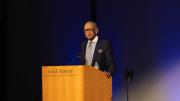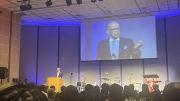Hundreds crowded the John F. Kennedy Presidential Library and Museum on the evening of June 22, donning their finest attire and nametags that read “A friend of Mel,” to pay homage to Melvin B. Miller ’56, who founded The Bay State Banner in 1965. Miller was the editor and publisher of the newspaper, an important voice for Boston’s African American community, for the past 58 years. Following a reception in the building’s museum pavilion, a nine-story glass atrium with near-360 degree views of Boston’s skyline and the sparkling waters of Columbia Point, guests filed into Smith Hall for an evening dinner with live music, heartfelt speeches, and dives into the history of Miller’s work.
Among those who delivered live and digital tributes to Miller were Massachusetts politicians, including Boston Mayor Michelle Wu ’07, J.D. ’12, U.S. Senator Elizabeth Warren, Congresswoman Ayanna Presley, and Governor Maura Healey ’92; media professionals, such as radio personality Tanya Hart, communications executive Colette Phillips, and WGBH’s “Greater Boston” hosts Margery Eagan and Jim Braude; and academics, including MIT research scholar Topper Carew and UMass Boston Chancellor Emeritus J. Keith Motley.
A native of Roxbury, Massachusetts, Miller “committed himself to unwavering dedication and tireless efforts to pave the way for countless voices to be heard, for stories to be told, for truths to be revealed, and for the news to keep us informed,” said Roxbury pastor Willie Bodrick II in the evening’s opening prayer. WCVB anchor Jessica Brown, who emceed the event, added that Miller captured “personal stories about racial discrimination, about legal intel and health inequities, about art and cultural milestones, and so much more.”
Mayor Wu, who called the Banner the “the largest, oldest, and most trusted Black community newspaper in New England,” praised Miller’s pivotal role in shaping the city’s cultural landscape. She said the paper amplified “the voices of Black families, businesses, and communities, championing civil rights with the highest-quality fact finding, truth telling, and journalism.” The event celebrated Miller’s formative role in that work, and the transition to new leadership: Ronald Mitchell will now take over as publisher and editor of the Banner, with Andre Stark as associate publisher.
Alberto Vasallo III, president and CEO of the state’s oldest Latino paper, El Mundo, expressed how Miller reminds him of his father. Both were stubborn, defiant, and strong-willed men, he said, “who started their respective publications in a city at a time very different than now,” during the civil rights movement and desegregation bussing efforts. Vasallo credited conversations with Miller for helping him navigate the challenges faced by “oftentimes overlooked and overshadowed” non-traditional minority outlets. “Mel, you have led, you have pioneered, you have trailblazed, you have inspired,” Vasallo said. “And for all of that, muchas gracias de mi corazón.”
Jazz, R&B, and folk tunes, billed as “musical tributes” to Miller, reverberated through the venue between speeches. Members of the Boston Community Choir even got the crowd to join them in a soulful performance of “Glory.”
At the event’s close, Miller himself took to the stage, reflecting on the Banner’s half-century journey and the path ahead. “The Banner didn’t just come out of thin air. It was a hard, hard battle to make it happen,” he said. He and his friend, fellow Roxbury native Otis Gates III ’56, went to high school and college together, and were struck by the abundance of opportunities and resources available at Harvard. They asked themselves, “How are we going to make things better for all the folks left behind, who couldn’t cross the river to get to Harvard?”
Embracing the progressive spirit of the times after President Lyndon Johnson signed the 1964 Civil Rights Act, they found their answer: a newspaper that would bring lasting change for local Black people. But it was a gamble, Miller said, because “You have no assets, no job, no anything but an idea—an idea that somebody’s willing to put their foot on the line for.” Additionally, “50 odd years ago, there were no institutions. There weren’t all these nonprofits ready to throw some money into this and help you out. There was you and a few friends. That’s all there was.” Nonetheless, the Banner persisted, endured, and emerged as a community staple.
In his closing remarks, Miller imparted a final lesson to his audience: the key to success is a team. He thanked his wife Sandra Casagrand, who he described as “so energetic, so brilliant, so smart, able to solve almost any kind of problem”: “I will guarantee you that without her support and help over the years, there would be no Banner today.” Of the praise directed toward him during the night, Miller said, “It’s very nice to hear people say all these encouraging and flattering things about me, but I’m not fooled because I know that I didn’t do all these things—I had teams to do it.”









